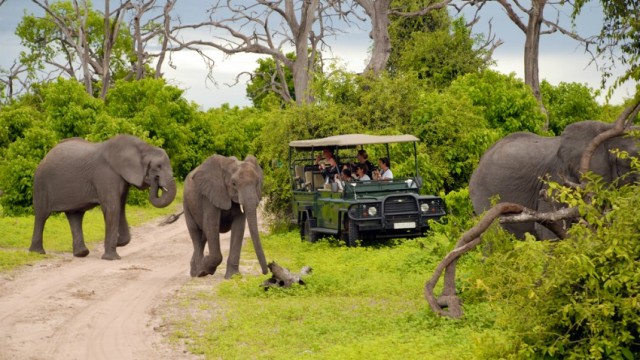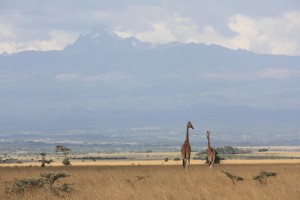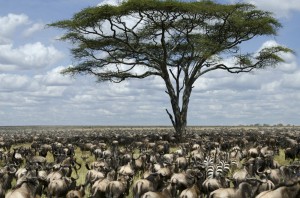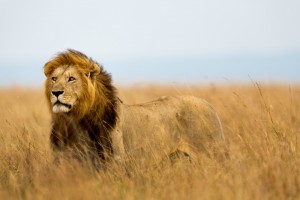Africa has the unique distinction of being the best – and one of the only – places on Earth to go on safari. The sheer number of mammals, thousands of square miles of wide open space, and breathtaking terrain combine to make a safari the quintessential African experience. This guide to planning a safari should take some of the guesswork out of where to go, when to go, and what type of experience suits you best.
Where to Go
The top nine countries for safaris are located in east and southern Africa, and include Botswana, Zimbabwe, Zambia, Namibia, South Africa, Tanzania, Kenya, Uganda, and Rwanda.
A close second are countries in central Africa and the offshore islands, such as the Republic of Congo (not to be confused with the much larger Democratic Republic of Congo), Ethiopia, Mauritius, and the Seychelles.
But where you go should not necessarily be determined by country, rather by your specific desires for game viewing, price, comfort, convenience, and accessibility. Almost all the above countries offer a variety of animals, accommodation and activities.
For example, Kenya offers the hot, dry savannahs of the massive Masai Mara National Reserve, where it’s easy to see the Big Five (lion, elephant, buffalo, leopard, rhinoceros) from 4WD safari on roads that are sometimes crowded with tourists from Asia, Europe and South America. But also in Kenya is the thickly-forested Aberdare National Park, where the weather is cooler and wetter and you’re more likely to trek on foot rather than in a vehicle. The dense vegetation makes animals harder to see, but you’ll rarely encounter another visitor – just lots of black leopards, buffalo, antelope, and rhinos.
If you want a more undeveloped, pioneer setting, head to somewhere like Malawi or Mozambique, which may be rougher around the edges, but cater to those who like to get off the beaten path. Want to get really exotic? Then head to the remote reaches of Congo where you can see endangered eastern lowland gorillas in their native jungle habitat. But be warned that it may require multiple airline transfers plus an arduous overland trek to get there.
When to Go
In broad brush terms, the best game viewing in the east and central African countries (Kenya, Tanzania, Uganda Rwanda, and Congo) is from mid-December to mid-March, and then again from June through mid-November. Southern Africa (Namibia, Zambia, Zimbabwe, Malawi, Mozambique and South Africa) really comes alive from June through October. These seasons are driest, which is when game tends to congregate around watering holes. In jungle areas, vegetation is also less dense during the dry seasons, which makes viewing easier.
However, you may find that you prefer to go on safari during the rainy or off-season, when there are fewer tourists and less dust. Prices are generally lower in the off-season too, and though game is a little harder to find, it doesn’t disappear. And some parks and reserves, such as the Central Kalahari Game Reserve in Botswana, are actually better during the “green” season.
Having said that, bear in mind that some types of safari are extremely time-dependent. If you want to see millions of animals crossing the Grumeti and Mara rivers in Tanzania and Kenya (one of the great spectacles of the Serengeti migration), you have to be there between July and September.
What Type of Safari
A safari is not a one-size-fits-all proposition. The length of the trip, type of transport, range of activities, and level of accommodation varies wildly from place to place. There are flying safaris, guided driving safaris, self-driving safaris, overland safaris, and even voluntourism safaris.
According to Mark Nolting, safari expert and president of Africa Adventure Company, guided tours are preferable to self-guided, as you benefit from the expertise of a seasoned professional guide and will probably end up spotting a lot more animals. Having said that, self-drive safaris are not a bad option for those who just have a day or two and don’t mind the hit-or-miss nature of the trip. Head to one of the big parks in South Africa or Namibia, where there are good roads, a decent range of wildlife, and it’s easy (and safe) for tourists to drive around unaccompanied.
Nolting does not particularly recommend overland safaris, where you are continually moving from camp to camp and even country to country, since they are often more about getting from point A to point B and the actual wildlife viewing can get lost in the shuffle.
And if you can afford it, Nolting says private guides are the gold standard. You get more individual attention than if you are with a group of strangers, and more flexibility to go to off-the-beaten path areas. Having said that, the quality of the guide is paramount, whether you are on a group safari with people you just met, or on a private tour with just your spouse and kids.
Activities can include not only the classic daytime game drive, but walking safaris, hot air balloon viewing, nighttime game drives, canoe trips, elephant rides, mountain biking and gorilla tracking. Many safari outfitters offer combinations of the above.
Another thing to consider is the type of accommodation you prefer. Lodging varies wildly from small, swank luxury lodges with Egyptian cotton sheets, gourmet chefs, swimming pools, and spas, to budget camping scenarios, where you cook over campfires and bunk in sleeping bags inside pup tents. Most are somewhere in between.
A note on terminology: A “lodge” is basically a hotel in or near a game reserve. It’s a conventional brick-and-mortar building with modern plumbing and some sort of restaurant or cafeteria. “Camp” is a term that covers a lot more territory, with the common denominator being the canvas tent you’ll sleep in. Otherwise a camp can be permanent, mobile or seasonal, and can range from high-end to budget. The stereotypical luxury tented camp offers spacious tents on raised platforms with designer furnishings, ensuite bathrooms, and gourmet meals.
Some travelers prefer tented camps because they allow you to get up close and personal with nature: oftentimes critters run right though the camps, and at night you can hear the sounds of animals going about their business. Others prefer lodges, because they allow you to leave the wildlife behind when you are done with your game drive for the day.
Cost
Depending on the length, location, and type of facility – lodge, tent, luxury tent, mobile, or a budget camping affair – the cost can range anywhere from $100 (for a one-day self-drive journey) to $10,000 (for a 10-day luxury “glamping” affair). And don’t forget to factor in airfare.
Choosing a Safari Outfitter
Trips to Vegas or Hawaii can be arranged with a computer and a few clicks of a mouse, but safaris are NOT something you want to put together by yourself using just the computer. Safaris are complex affairs where a professional safari-planning specialist with first-hand experience in Africa is your best asset. He or she can help you navigate through the maze of choices and options so you end up with a holiday that suits your needs, activity level, comfort zone, and budget.
Of course you can narrow down your preferences in advance by doing some online (or offline) research: there are many printed reference guides and online resources that can help with this. For example TripAdvisor or SafariBookings.com allow you to compare different lodges, game parks and tours by reading professional and traveler reviews. (Please don’t take TripAdvisor reviews as gospel, just a guideline.)
Once you have a good idea what kind of safari you want, find a safari specialist who caters to that particular need. Not all safari planners handle all regions and all types of trips. Some are experts in pricey luxury camps, while others know Uganda better than other countries.
When you pick a safari planner, make sure to ask pertinent questions: how long they have been in business? Have the staff have personally experienced the tours/lodges? Is airfare is included in the price? How large are the groups? Do they offer off-the-rack trips or bespoke journeys? Can they offer references/testimonials from previous clients?




